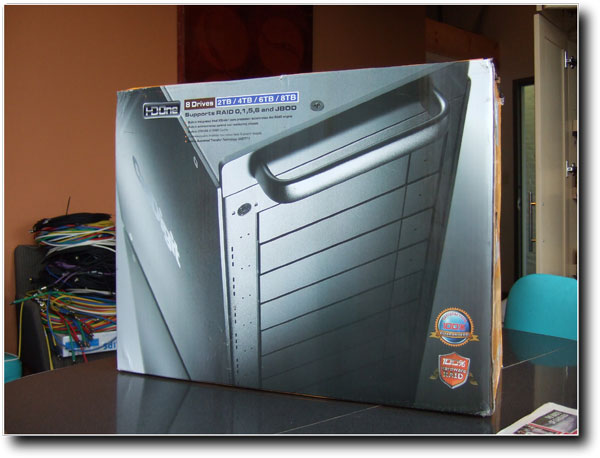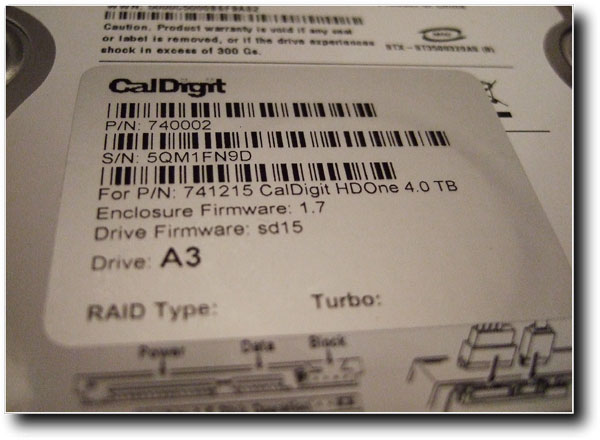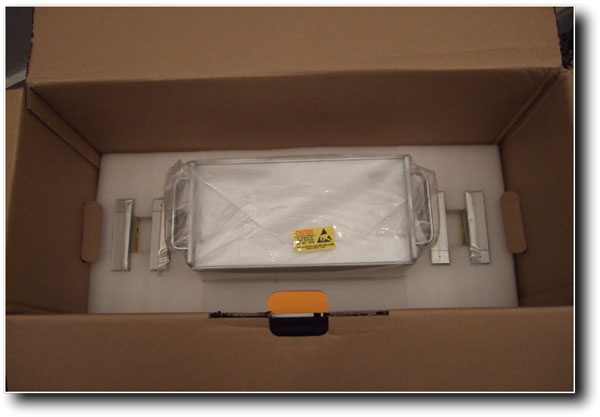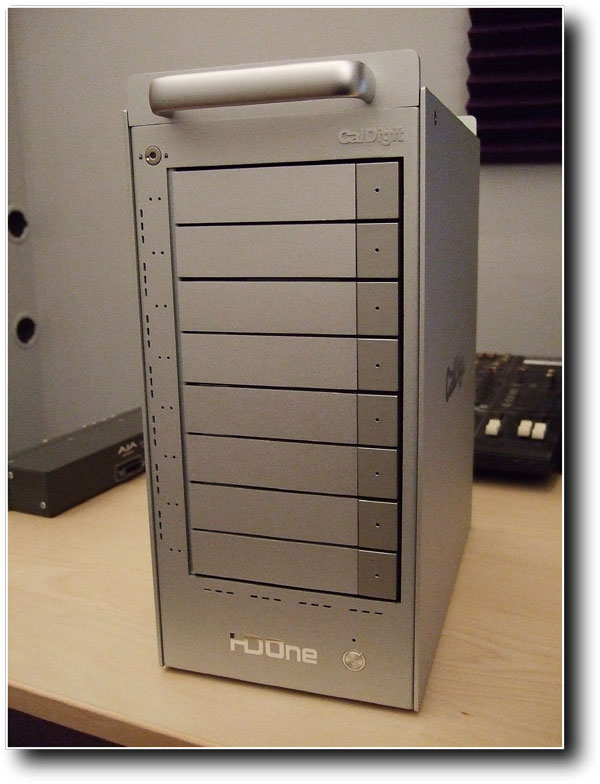In early 2008, CalDigit
announced their new line of SATA raids called HDOne. The HDOne
model is positioned as a low cost SATA raid capable of raid 0,1,5,6
and JBOD. The HDOne ranges from a 2TB to an 8TB unit and (BHphoto.com)
has a list price of about $2,200 for the 2TB unit and $7,600
for the 8TB unit. A 2TB raid 5 unit for around $2,200? This is
pretty remarkable! If your work involves any uncompressed HD
formats, keep on reading.
My test unit was a 4TB that came already
formatted in a raid 5. That's a thing of beauty because you don't
need to spend any time formatting the unit when you first set
it up. You're ready to go in about 15 minutes.
Here are some pictures that I took of
the setup:

Here's the box that it gets shipped in.
Fancy! Excuse all the cables in the background!
Upon opening the box, you'll see 4 of
the 8 drives all neatly and safely packed in Styrofoam. You'll
also find the SATA cable, power cable, and the host card packed
in it's own box.

See how careful CalDigit is about their
packing! Each drive bay is securely placed in their own Styrofoam
slot.

On top of that, each drive bay is clearly
labeled in their order. This is drive A3 out of 8. The one odd
thing is that the first drive is labeled 0 instead of 1, so you
have a total of 8 drives from 0 to 7.

Lift up the top layer of styrofoam and
you'll find the rest of the drives and the actual raid unit at
the bottom.

The unit is deceptively small. Even though
it's an 8 bay box, it's still pretty compact. Here's the unit
sitting next to a HDCam tape.


Here's the drive. Each drive has already
been attached to a drive tray.

All you need to do is pop the trays inside
the box in the appropriate order.

There you go! All done! If you need to
remove a drive tray, you'll need to use a key that is included
with the unit. Pop the key inside the hole on each bay, the tray
handle will pop out and you can slide the tray out.

A 4TB unit configured in a raid will
give you about 3.2TB of free space. This will give you about:
- 258 hrs of DV25
- 121hrs of NTSC ProRes HQ SD
- 34hrs of uncompressed 10bit SD
- 67 hrs of DVCProHD 720p60
- 6 hrs of Uncompressed 10bit 1920x1080 29.97fps
My current project is a collection of
videos for the Smithsonian Institution's Ocean Hall exhibit within
the Museum of Natural History in Washington, DC. All our footage
will be onlined at uncompressed 10bit 1080i. We needed a fast
and reliable raid and I was psyched to test out the HDOne on
this online.
We're using the early 2008 8 core Mac
Pro tower with a Kona
3. After installing the drives inside the HDOne unit, I opened
up the Mac Pro and installed the host card. With this model of
Mac Pro, all the lanes are auto-configured. All I needed to do
was to put the card in slot 4 since the Kona card was in slot
3. This took about 5 minutes. I then connected the eSata cable
from the card to the box and I was ready to go.
This HDOne unit is basically plug and
play. It's already configured in a Raid 5. Once it was powered
up, the HDOne appeared on the desktop. Final Cut Pro saw it in
the scratch disk menu and it was ready to go. With the Kona 3
card, we captured uncompressed 1080i 10bit, up-converted SD,
and cross-converted 720p - all flawlessly - zero drop frames
- not even once!
Here are the speed tests of the HDOne
at 30% full:

You'll see the Write speed at 335MB/sec!
Way above the required 165 MB/sec needed for 1080i 10bit. And
you'll see the Read speed of 445MB/sec! I was able to consistently
get two streams of 1080i 10bit for playback. I was able to get
three streams if I set FCP into Unlimited RT and Dynamic.
But how does it perform when it's nearly
full? Here's the speed tests at 90% full:

I know you're not supposed to fill a
raid up this much, but hey - real world testing!
You see that we're still getting Write
speed at 333MB/sec and Read speed at 401 MB/sec at 90% full.
This is pretty amazing!
We've used this unit for about six weeks
of daily onlining. We've beaten up this unit in a pretty rigorous
real world project and I've encountered no issues with the HDOne.
If your post situation requires uncompressed HD onlines, then
the HDOne should definitely be on your short list of Raids to
consider. Even if you're using compressed formats like ProRes
and DVCProHD, you'll still benefit from the speed and robustness
of the HDOne.
I've read good reviews about CalDigit's previous products, but
having first hand experience with this HDOne has spoiled me for
any future raid boxes from other manufacturers.